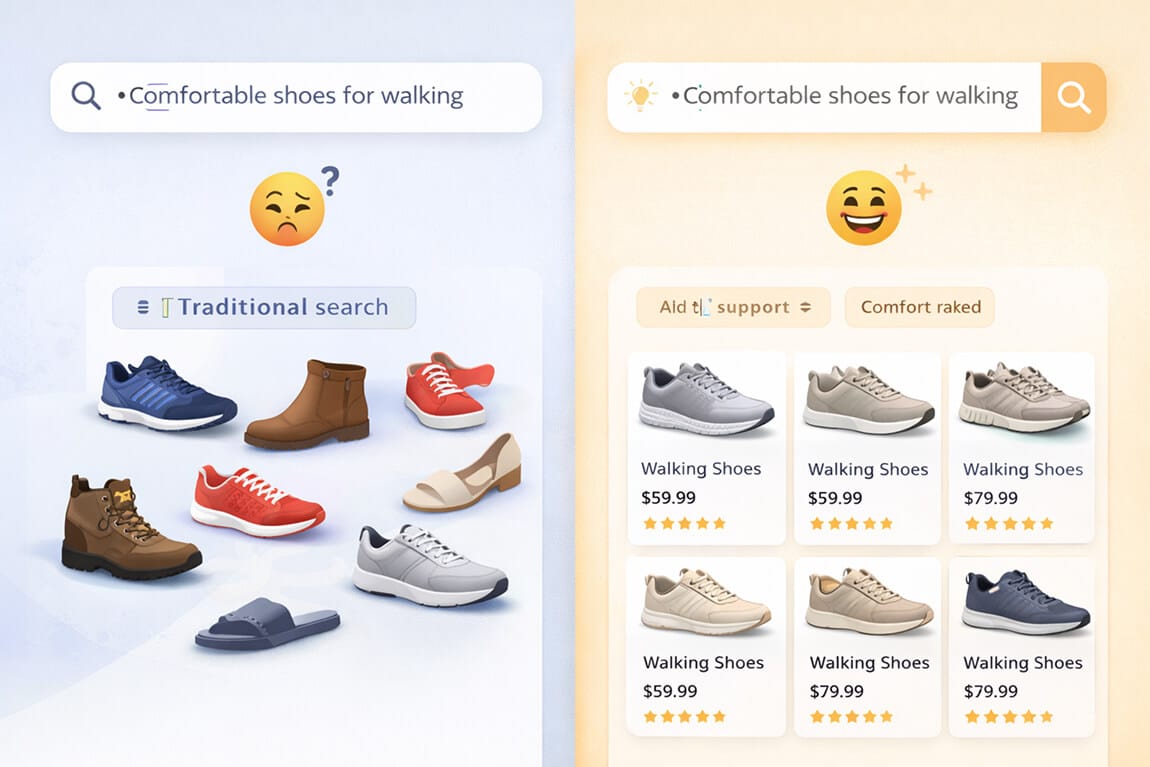
Do you know that a lot of online stores are already using AI in E-commerce to boost their sales and make shopping smarter? From the outside, it might just look like a regular website, but behind the scenes, AI is doing a lot of the heavy lifting. It’s helping businesses show the right products, answer customer questions instantly, and even predict what you might want to buy next. AI isn’t some complicated tech thing only big companies can use. It’s actually becoming common and very helpful, especially in ecommerce. In this article, we’ll break down how AI in ecommerce is changing the way we buy and sell online, the powerful tools behind it, and how you can start using it to boost your own business.
What is Artificial Intelligence in Ecommerce?
Artificial Intelligence (AI) in e-commerce refers to the use of advanced technologies to enhance various aspects of online shopping. It helps stores automate tasks, personalize the shopping experience, and make smarter decisions by learning from customer data. Unlike traditional e-commerce systems that rely on basic functions and manual input, AI can adapt, predict, and improve over time. For example, while traditional e-commerce systems might simply display products in a static list, AI-based platforms go further by recommending personalized products based on what customers have browsed or purchased before. Also, these systems can handle customer service through chatbots and adjust inventory based on real-time demand.
Types of AI Technologies Used for Ecommerce
AI is not a single technology; it includes several models. Below are the major AI technologies used in e-commerce:
Machine learning (ML)
Machine learning uses statistical techniques, including algorithms, which allow computers to learn from data and make predictions or decisions without being explicitly programmed. Deep learning models like transformers and large language models (LLMs) like OpenAI’s ChatGPT use algorithms to improve data understanding. Let's say a customer wants to buy a laptop, the e-commerce platform could recommend a laptop bag, mouse, keyboard, or software. Invariably, machine learning algorithms keep track of which items are bought together over time and determine which combinations are most likely to result in a sale. So the platform can fine-tune its suggestions to show the most relevant things for each customer, and that boosts conversion rates.
Natural Language Processing (NLP)
Natural Language Processing (NLP) is a smart technology that enables computers to understand how humans speak or type. In online shopping, NLP makes search boxes work better. It helps the website understand what the customer is looking for, even if they make a mistake or use different words. For example, if a customer types “hoodie” and someone else types “sweatshirt”, NLP knows those mean the same thing and shows the same products. Contrarily, if a customer mistakenly types “hedphones” instead of “headphones”, it still gives you the right results.
Also, NLP understands different forms of a word. When a customer searches for “cycling”, it will also show results for “cycle”, “cycled”, and “cyclist”. This smart tech makes shopping easier as you don’t have to use the exact word or perfect spelling. Just type what’s on your mind, and the site will figure it out.
Deep Learning
Deep learning is modeled after the human brain. It is a highly complicated subset of ML. When doing tasks like identifying a product image or calculating a credit score, deep learning platforms don’t need to be told which features of a dataset are important. They figure it out on their own. These platforms are fast, accurate, and can handle massive datasets that some AI algorithms can’t handle, which are very useful in e-commerce.
Generative AI
Generative AI is a smart technology that can generate new audio, text, images, and videos. It uses large language models (LLMs) like ChatGPT to understand and generate human-like content. In e-commerce, generative AI is super useful in the following ways:
- Product descriptions: If a store has hundreds or thousands of products, it’s hard to write descriptions for all of them. Generative AI can create clear, helpful, and unique descriptions for each product.
- Chatbots and customer service: With generative AI, online chatbots can sound more human, give better answers, and even understand how a customer is feeling. They can help shoppers find the right product, answer questions, and solve problems, 24/7.
How is AI Changing Ecommerce?
Here are some ways AI is revolutionizing e-commerce:
1. Personalized Customer Experience
AI makes your online store feel like a shop assistant who knows what your customer likes. It looks at browsing history, past purchases, and clicks to suggest products that fit each person’s style.
According to research, 80% of shoppers are more likely to buy when brands offer a personalized experience. With AI, you can greet customers by name, show them products they’ll love, and even offer them special deals.
2. Fraud Detection
Online fraud is scary, but AI is like a watchdog for your store. It can spot strange behavior fast, like someone buying lots of stuff really quickly or using a stolen card. AI studies patterns and alerts you when something seems off. In fact, businesses using AI for fraud detection see up to a 50% drop in fraudulent activity. It’s like having security guards online 24/7 protecting your money and your customers.
3. Automating Customer Support
Answering customer questions all day is time-consuming. But with AI chatbots, your business can help customers 24/7 with no coffee breaks needed. These bots can answer common questions like “Where’s my order?” or “How do I return this?” And what makes these chatbots even better is that they get smarter over time. Interestingly, 69% of customers tend to use chatbots more to get quick questions. With AI, you can save time and keep your customers happy by attending to their queries day or night.
4. Dynamic Pricing and Smart Inventory Management
AI is great at adjusting prices to match demand. If something’s selling fast, it can raise the price a bit. And if sales slow down, it can offer discounts. Also, it watches your stock and tells you when to restock before you run out. This means more sales and less waste.
5. Product Descriptions
Writing product descriptions for every item is a nightmare, especially if you have a lot. Fortunately, AI can write clear and accurate descriptions in seconds. It can even match your brand tone. This saves you time and makes your products look more professional. So, instead of writing for hours, let AI do the hard work while you focus on growing your business
6. Making the Right Recommendations
Have you ever noticed how Amazon manages to "just know" what you want? That’s Artificial Intelligence in E-commerce at work. It looks at what customers click on, what they buy, and what others with similar tastes enjoy, then recommends the best products. Interestingly, these suggestions feel helpful, not pushy. Amazon says 35% of its sales come from product recommendations like these, which is huge. When you use AI to guide your customers, they’re more likely to buy more, and they’ll feel like your store really “gets” them.
7. Increasing Conversion Rates
AI helps turn visitors into paying customers by showing the right products, sending smart follow-up emails, adjusting prices, and offering quick help through chatbots. Every little improvement adds up. In fact, businesses that use AI tools often see conversion rates jump by 20% or more. It’s like fine-tuning your store so everything works better, and you make more sales without needing more traffic.
How to Apply Artificial Intelligence to Ecommerce
AI in e-commerce is exciting; however, it’s important to have a clear plan. Without one, you could waste time, money, and effort. Here's how to get it done:
1. Start with a clear plan
Starting somewhere is necessary, and your strategy will outline the steps you must take to reach your AI goals. Avoid passing this off to your CIO, CTO, or a recently hired AI specialist. Also, give careful consideration to the goals you have for AI. Remember to start modestly and adopt a realistic mindset. Successes can always be built upon in the future.
2. Focus on more important tasks
The most successful AI use cases combine corporate goals, data differentiation, and widely available artificial intelligence models. All of this simply shows that you should concentrate on revenue-generating possibilities where you have a data edge and in a context that is suited for established AI technology.
3. Get help from AI experts
Even if you’ve read about AI online, getting help from real experts can save you from mistakes. You can bring in a small team or hire someone for a short time. They can help you test ideas and build a strong starting point.
4. Build your full version
Building the full-scale solution is the next step after you're satisfied with the work your team has done. You shouldn't be shocked if it still requires some tweaks until it functions as you had anticipated. The projects you undertake will begin to yield more advantages as you and your team gain experience working in the field of artificial intelligence.
What Tools Can I Use to Implement AI in Ecommerce?
To successfully implement AI in your e-commerce business, you need the right tools. Below are some of the top AI-powered solutions:
1. Sparq

If you run a Shopify store, Sparq makes it easier for customers to find what they need quickly and with fewer clicks. It adds smart, intuitive filters to your collection pages and improves your search bar so shoppers get accurate results, even with detailed queries. This smoother shopping experience keeps people engaged, with many stores seeing a 30% increase in time spent on site and a 40% drop in bounce rate. On top of that, 35% of shoppers actively use Sparq’s filters, leading to faster product discovery and fewer drop-offs. Even better, stores have reported a 12.5% boost in average order value.
2. Shopify Magic

Shopify Magic is a collection of tools for Shopify users that cover the bulk of an e-commerce store's customer-facing functionality. You can utilize its picture editor to change the background of product images, and its article production tools to generate SEO-friendly product descriptions and FAQs. Sidekick, its newest product, provides Shopify customers with internal help 24 hours a day, seven days a week by gathering performance statistics, delivering ecommerce recommendations, and brainstorming creative ideas.
3. ChatGPT

OpenAI's ChatGPT chatbot can assist your e-commerce company with a range of content requirements, such as blog posts, product descriptions, social media posts, and marketing emails. It can also be used to do market research, generate content ideas, locate important keywords, optimize material for search, and copyedit existing content. Other capabilities include extensive data analytics for marketing teams, as well as online browsing functions that provide access to current information.
4. Boost.AI

Boost.AI is a conversational AI chatbot that enables business owners to harness the power of AI in customer service. You can use it to enable consumer self-service as an autonomous virtual agent or to supplement your real customer service team. In addition, Boost.AI can respond to consumer inquiries, resolve issues, and provide proactive recommendations based on predicted needs.
5. Surfer AI

Surfer is a search engine optimization (SEO) software. This AI technology can generate SEO-optimized content in response to a keyword. You give the program a target phrase, choose the article settings, and create an article outline for assessment. It will produce a full article once you give your approval to the outline.
Conclusion
AI is revolutionizing e-commerce by making shopping smarter, faster, and more personalized. As AI tools continue to evolve, integrating them into your e-commerce business can boost sales and efficiency. If you're ready to take your online store to the next level, Sparq's AI-powered search tool can help enhance your product discovery process. So, why not book a demo with Sparq today and see how it can transform your e-commerce business?
FAQs
1. How big is the AI in e-commerce market?
The AI in e-commerce market is growing fast. It's expected to reach over $20 billion in the next few years, helping online stores improve sales and customer experience.
2. How will AI change online shopping?
AI will make online shopping smarter. It will help recommend products, answer questions, set prices, and make shopping faster and more personal for each customer.
3. What is the future of AI in e-commerce?
Artificial intelligence will improve customer service and allow companies to provide real-time product recommendations, adding dynamic elements to the shopping experience.










